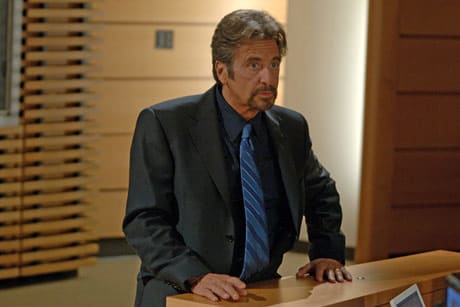88 Minutes title is misleading. Beginning in 1997, it flashes forward nine years before the real-time clock starts ticking. Originally slated for a 2006 release, the thriller saw its debut repeatedly postponed, which, despite the irony, is never a good sign. And the film it lives down to this omen.
Al Pacino stars as Dr. Jack Gramm, a superstar professor and FBI forensic psychologist that doesnt let his tacked-on haunted past interfere with his womanising, fine-wine imbibing, crime solving and inexplicable wealth accumulating. Life is grand until an old case comes back to pester him.
A Scream-invoking modified voice calls to give Gramm a death threat replete with the titular time constraint mere hours before a man he helped convict goes to the gas chamber. The temporal device should increase the tension (see The Ring) but laughable intermittent phone calls a murderous snooze alarm that checks in every few minutes and signs off with an internal rhyme/catchphrase and a host of thinner-than-Twiggy (too dated a reference?) interlopers grind the pace to a crawl.
Real-time can prove compelling if properly used (see Before Sunset and, to a lesser extent, Timecode), even in a thriller (see 24), and the structures not the real problem. Fraught with contrivances aplenty and non sequitur red hearings, falseness pervades. FBI agents refer to the killer as "the Seattle Slayer without cracking a grin; a perpetually disaffected Gramm cracks wise while under duress; and even the supposed Seattle setting boasts tell-tale Vancouver landmarks (is that a Hastings Street sign? A Shoppers Drugmart?).
Disappointingly, the supporting cast is littered with wasted talent, presumably pulled in Michael Corleone-style by Pacinos involvement. Alicia Witt, Leelee Sobieski, Amy Brenneman and Deborah Kara Unger play essentially interchangeable 2-D female sycophants/assistants, while William Forsythe gets the same tough guy role hes built a career on.
To make up for the shallowness, or perhaps because of severe near-sightedness, director Jon Avnet compensates with close-ups for everyone, but all the bulging eyes and pensive detachment in the world cant offset the films slightness and overt contrivance.
(Sony)Al Pacino stars as Dr. Jack Gramm, a superstar professor and FBI forensic psychologist that doesnt let his tacked-on haunted past interfere with his womanising, fine-wine imbibing, crime solving and inexplicable wealth accumulating. Life is grand until an old case comes back to pester him.
A Scream-invoking modified voice calls to give Gramm a death threat replete with the titular time constraint mere hours before a man he helped convict goes to the gas chamber. The temporal device should increase the tension (see The Ring) but laughable intermittent phone calls a murderous snooze alarm that checks in every few minutes and signs off with an internal rhyme/catchphrase and a host of thinner-than-Twiggy (too dated a reference?) interlopers grind the pace to a crawl.
Real-time can prove compelling if properly used (see Before Sunset and, to a lesser extent, Timecode), even in a thriller (see 24), and the structures not the real problem. Fraught with contrivances aplenty and non sequitur red hearings, falseness pervades. FBI agents refer to the killer as "the Seattle Slayer without cracking a grin; a perpetually disaffected Gramm cracks wise while under duress; and even the supposed Seattle setting boasts tell-tale Vancouver landmarks (is that a Hastings Street sign? A Shoppers Drugmart?).
Disappointingly, the supporting cast is littered with wasted talent, presumably pulled in Michael Corleone-style by Pacinos involvement. Alicia Witt, Leelee Sobieski, Amy Brenneman and Deborah Kara Unger play essentially interchangeable 2-D female sycophants/assistants, while William Forsythe gets the same tough guy role hes built a career on.
To make up for the shallowness, or perhaps because of severe near-sightedness, director Jon Avnet compensates with close-ups for everyone, but all the bulging eyes and pensive detachment in the world cant offset the films slightness and overt contrivance.




